How Ukrainians ‘de-Russify’ themselves
Fewer Ukrainians speak Russian and monuments are being taken down, but some warn a ‘language of hatred’ has taken over.
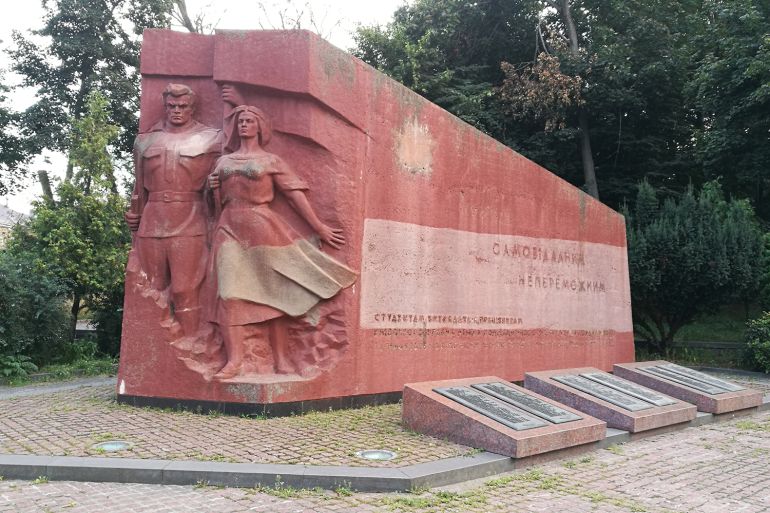
Kyiv, Ukraine – Oleksiy Savchenko stopped speaking his mother tongue the day Russia invaded Ukraine.
“Before the invasion, I was a Russian speaker,” the former businessman told Al Jazeera, in Ukrainian.
Keep reading
list of 4 itemsRussia-Ukraine war: List of key events, day 204
Ukraine dam hit by Russian missiles in Zelenskyy’s hometown
Putin does not believe Ukraine war a ‘mistake’: German leader
Since 2014, when Russia annexed Crimea and backed separatists in Donbas, he has headed the Army SOS, an NGO that supplies precision guidance software for Ukraine’s military.
But despite his anti-Moscow stance, Savchenko kept using Russian in daily life.
He was born and raised in Kharkiv, Ukraine’s second-largest city with a pre-war population of 1.5 million that lies close to the Russian border, and remains Russian-speaking.
But since the invasion began on February 24, Russian forces have pummelled Kharkiv almost daily – killing hundreds of civilians and displacing thousands.
Kharkiv is in the upper part of Ukraine’s Russian-speaking crescent formed by its eastern and southern provinces.
The rest of Ukraine has sizeable Russian-speaking populations, including the capital, Kyiv, where Savchenko lives now – and where Russian is still heard far more often than Ukrainian.
Breaking the balance
The linguistic balance between Ukrainian and Russian, two linguistic siblings, has changed dramatically in the past decade.
In 2012, 40 percent of Ukrainians considered Russian their mother tongue, while 57 percent said Ukrainian was their primary language, according to the Ratings Group, an independent pollster.
A month after the invasion began, a staggering 76 percent of Ukrainians said Ukrainian was their primary language, and only one in five said they still mostly spoke Russian, the pollster said on March 25.
A third of Russian speakers said they plan to switch to Ukrainian exclusively, it said.
Ukraine is also home to dozens of ethnic groups, including Hungarians, Roma and Crimean Tatars whose languages are recognised and protected as “native tongues”.
“Adherence to Russia wasn’t determined by the language of communication but by one’s political views and the influence of propaganda, and correlated with the level of one’s support of pro-Russian parties,” the poll’s authors concluded.
This reasoning had applied to Savchenko, who for years was critical of Russian policies but yet spoke Russian, until he could no longer stand to speak the language of invading forces.
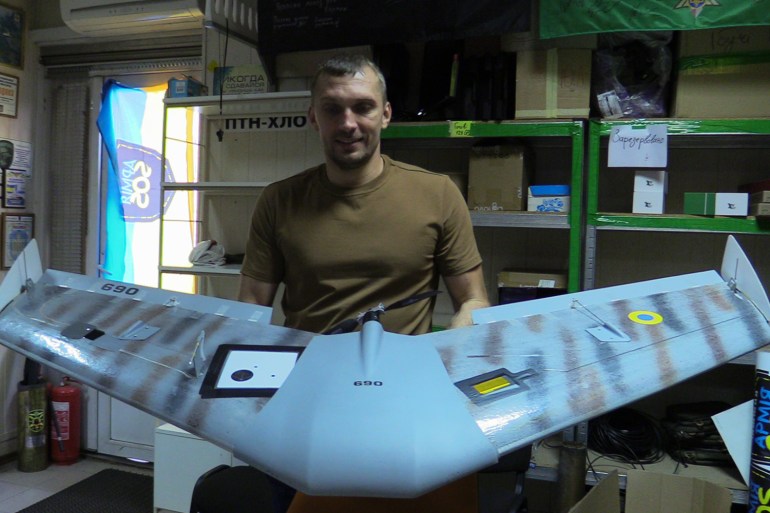
Since Russian President Vladimir Putin came to power in 2000, “the protection of the Russian language” has become a pretext for dozens of diplomatic spats with ex-Soviet states and the West.
Moscow has repeatedly complained to the United Nations, the European Union and international bodies about the “violation” of the rights of Russian speakers from the Baltic states to Central Asia.
But Ukraine has been the focal point of Moscow’s linguistic concerns and Putin has repeatedly claimed that Russians and Ukrainians are not two separate ethnicities.
“I will never reject my conviction that Russians and Ukrainians are one people,” he told Russia’s Security Council on March 3, a week after the war began.
“I consider the wall that emerged in recent years between Russia and Ukraine, between parts of essentially one historic and cultural space, as one big, common problem, as a tragedy,” Putin wrote in July 2021 in a lengthy article that enraged Kyiv.
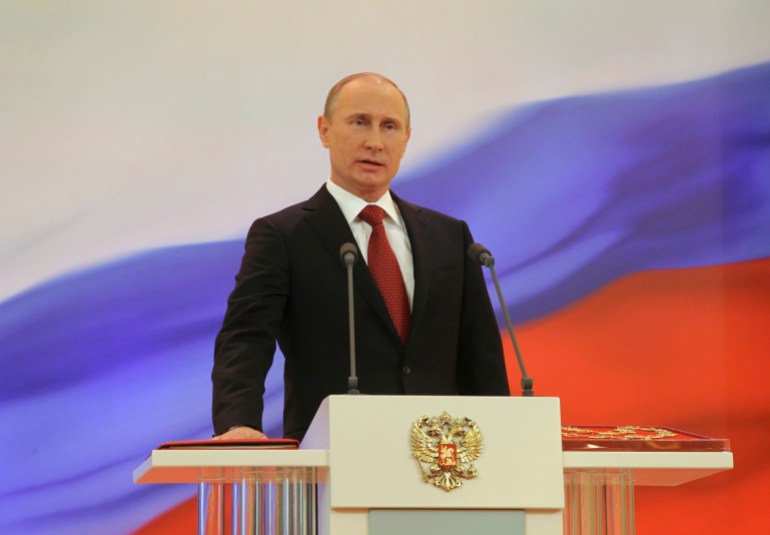
“We are definitely not one people. Each of us went their own way,” Ukrainian President Volodymyr Zelenskyy has said.
Kyiv, on the other hand, has spurred “Ukrainization”, abolishing in 2014 the use of Russian as a “regional language” of administration and education in eastern and southern provinces.
This move became Moscow’s official pretext to annex Crimea and back separatists in Donbas.
Meanwhile, the Kremlin ignores the linguistic rights of almost two million ethnic Ukrainians who lived in Russia before Crimea’s annexation, forming its second-largest minority.
No public school in Russia allows teaching in Ukrainian, while many Ukrainians are pressured to register as ethnic Russians during national censuses.
For many in Ukraine, the ongoing war has become the ultimate reason to give up Russian and the culture associated with it.
They seem not to care whether this heritage helped shape their mentality and cultural DNA.
“We don’t just have to stop speaking Russian, we have to stop thinking in it,” Olena Pribytko, a 59-year-old lawyer who graduated from a Russian-speaking school and university in Kyiv in the 1980s, told Al Jazeera.
She is still indignant about how Ukrainian was stigmatised as a lowly language that only befits villagers in the Soviet era and post-Soviet 1990s.
“Everyone who spoke Ukrainian was immediately branded a redneck. Because only rednecks spoke Ukrainian, we were told,” she said.
Meanwhile, Zelenskyy’s government has declared a sweeping de-Russification project.
Yet, the leader, whose unprecedented approval ratings surpass 90 percent, has not always championed monolingualism.
He grew up in a Russian-speaking Jewish family in the southeastern city of Kryvyi Rih, and rose to fame by appearing in comic shows on Russian television.
He founded and led District 95, a popular comic troupe that mixed Russian and Ukrainian in its performances and often lambasted the Ukrainisation steps.
During an election campaign that ended with a landslide victory in 2018, Zelenskyy often spoke Russian and pledged to revise official steps that dramatically limited its public use.
But when Verkhovna Rada, Ukraine’s lower house of parliament, adopted the limits in 2019, Zelenskyy did not veto them and said Ukrainian is “fully protected”.
“Everyone who raises the issues of ethnicity, language and church, these people just want a temporary hype,” he said.
Erasing all things Russian
The de-Russification of Ukraine has proceeded at breakneck speed throughout the war.
Hundreds of streets, squares and other locations named after Russian figures have been renamed across Ukraine, and hundreds more will get new names after online voting.
Memorial plaques with the names of ethnic Russian authors, artists scientists who visited, worked or lived in Ukraine have been removed – or will be, soon.
Statues will be demolished, and resistance to their removal is sporadic.
The mayor of the southern city of Odesa said he objected to the removal of the bronze effigy of Russian Empress Catherine II who founded the city that became one of czarist Russia’s most cosmopolitan centres, similar to Lebanon’s Beirut or Egypt’s Alexandria.
“Even if we remove monuments, history doesn’t change,” Gennadiy Trukhanov said in late August.
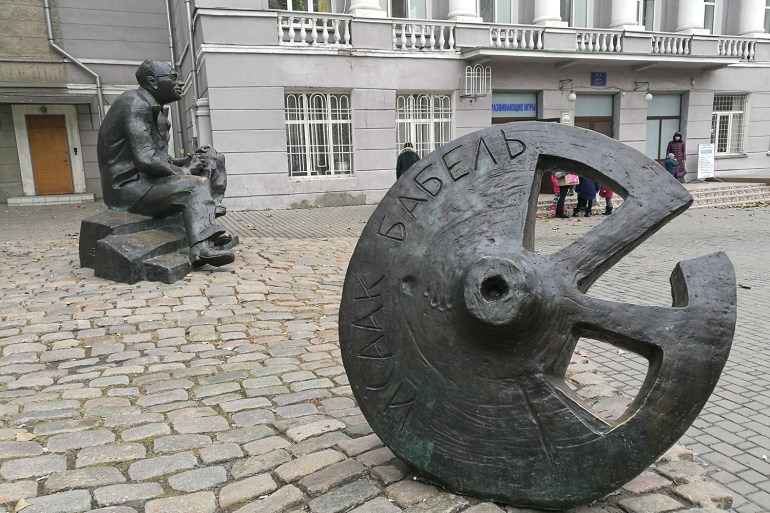
The public school curriculum no longer prescribes works by Russian authors, and books written by Russian nationals cannot be published any more.
No songs or music written or performed by Russians can be played in public – which was already perilous because street musicians singing them have frequently been beaten.
Only the Ukrainian Security Service can allow performances or publications to go ahead after the artists or authors personally request them after mandatorily denouncing “Russian aggression”.
The move – along with the COVID-19 pandemic and the war-triggered economic crisis – contributed to the financial ruin of many bookshops.
“We’re on the verge of bankruptcy,” Vadim, who owns one of the few remaining stores at the Petrovsky book market in northern Kyiv, told Al Jazeera.
He supports the de-Russification, but thinks its radical pace is not always positive.
Highly-specialised books translated and published in Russia are often the only way for Ukrainian scholars or medical doctors to learn about new developments, he said.
And textbooks for languages such as Bahasa Indonesia or Thai are simply not available in Ukrainian altogether because of low demand, he said.
Ukraine’s entertainment industry also took a hit.
Billboards advertising concerts of Russian rock and pop stars still dot Kyiv – but their shows have been cancelled for good.
Ukrainian artists such as pop diva Svetlana Loboda or drag queen Verka Serdiychka who often sang in Russian and toured Russia have lost a lion’s share of their revenue.
A handful of Ukrainian artists who moved to Russia and support the war have been blacklisted at home.
Hundreds of pro-war Russian celebrities have also been blacklisted and banned from entering Ukraine. Russian films and television series disappeared from silver and blue screens, although they still dominate illegal downloads along with Russian translations of new Western movies.
Also banned are the reruns of classic Soviet movies that have become part of the cultural makeup of older Ukrainians.
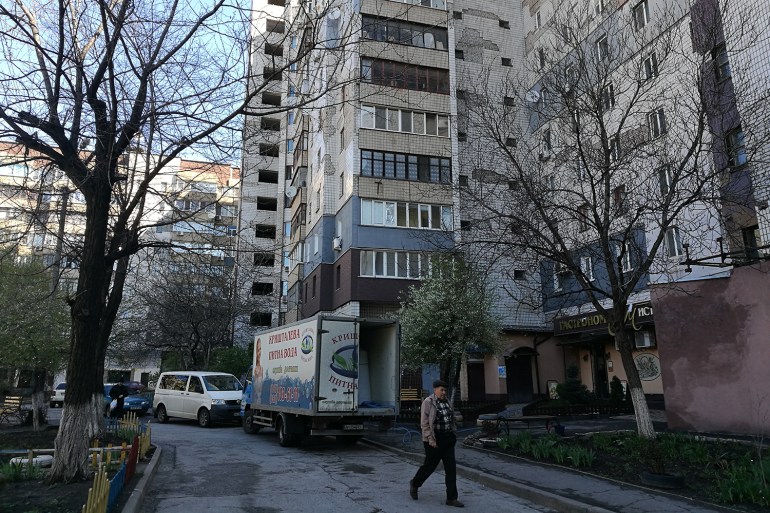
Many Ukrainians back these steps.
“Everything that is related to Russia is alien to me – songs, music, cinema,” Army SOS’s Savchenko said.
He recalled that when he was young, his father used to listen to Lyube, a Russian rock band that cultivated a masculine, nationalist image.
Savchenko also liked it – but stopped listening to it in 2014.
And although he no longer speaks Russian, he accepts when others use it around him.
Two Russian-speaking servicemen from the renowned Azov battalion came to his office on a recent afternoon.
He calmly listened to their questions and answered them in Ukrainian.
Although de-Russification makes Ukraine’s cultural landscape less diverse, it is a necessary step towards decolonisation, observers say.
“On the one hand, the cultural landscape is being simplified by the loss of multiculturalism, the knowledge of one more language and the neighbour’s culture,” Kyiv-based analyst Aleksey Kushch told Al Jazeera.
But on the other hand, the de-colonisation is similar to the rejection of all things Japanese in South Korea after World War II, he said.
And yet, the de-Russification does not always go hand in hand with tolerance.
“A good Russian is a dead Russian” is a popular meme that reversely reflects anti-Ukrainian sentiments in Russia.
Media reports increasingly portray every Russian as vile and corrupt, and poke fun at any misfortune that befalls them.
“Thank you. A giant turtle in Turkey bit a Russian tourist”, read a recent headline.
But to some Russian-speaking Ukrainians, this kind of attitude signals indiscriminate bigotry.
“They speak the language of hatred. I am never going to switch to that language,” a septuagenarian publicist who left Ukraine for Israel in April, told Al Jazeera on condition of anonymity.